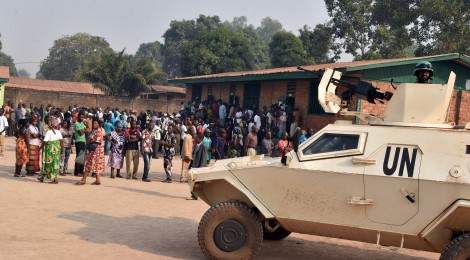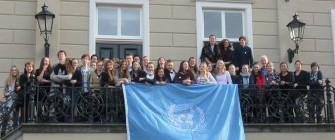
Policy Seminar: The Future of UN Peace Operations in a Changing World (26/09)
 On Monday September 26th the United Nations Association Flanders – Belgium, Leuven Centre for Global Governance Studies, Pax Christi Flanders and the Flemish Peace Institute organize a policy seminar on ‘the Future of UN Peace Operations in a Changing World’ in the Flemish Parliament, Brussels.
On Monday September 26th the United Nations Association Flanders – Belgium, Leuven Centre for Global Governance Studies, Pax Christi Flanders and the Flemish Peace Institute organize a policy seminar on ‘the Future of UN Peace Operations in a Changing World’ in the Flemish Parliament, Brussels.
Registration
Monday 26 September 2016, 12.00 pm – 5.15 pm
Flemish parliament (Peter Paul Rubens Room),
Leuvenseweg 86, Brussels
Participation is free, but we kindly ask you to register here
before 20 September.
Programme
|
12:00 pm – 12:30 pm |
Sandwich lunch (Masereel room) |
|
12:30 pm – 12:45 pm |
Welcoming remarks
|
|
12:45 pm – 2:45 pm |
Session 1: One Year After the HIPPO Report: UN Peace Operations and Protection of Civilians in Violent and Asymmetric Threat Environments: Chair: Prof. Dr. Ann Pauwels (VUB-KU Leuven, Vice-President United Nations Association Flanders Belgium)
Followed by a facilitated discussion. Q: What are some of the lessons from past UN peace operations in asymmetric threat environments, and what are the political and policy implications for the UN? What are the potential risks for UN peace operations in adopting preventive and preemptive posture and willingness to use force tactically to protect civilians? What kind of capabilities (military, police, civilians, field support), new technologies, postures and leadership are necessary for operational effectiveness in high-tempo risky environments to allow a UN peace operation to carry out its political and protection of civilians mandates safely and effectively? What are some of the lessons learnt from African Union and other offensive and stabilization operations in asymmetric threat environments? Should offensive and stabilization missions be outsourced to regional organizations and / or clearly delineated from other UN peace operations? How should the UN relate to parallel counterterrorism and offensive operations and ensure that is does not unwittingly jeopardize the political work of a parallel UN presence operating in the same mission area? How could and should UN peace operations integrate preventing violent extremism into relevant activities by addressing some of the political and governance factors that drive and sustain violent extremism? |
|
2:45 pm – 3:15 pm |
Coffee break |
|
3:15 pm – 5:00 pm |
Session 2: The Contribution of the EU and its Member States to UN Peace Operations
Followed by a facilitated discussion. Q: Are UN peace operations an answer to the increasing instability in the EU’s Neighbourhood? How can inter-institutional cooperation in the planning and conduct of EU support to UN peace operations be improved? What lessons can be learned from past engagements? How can individual EU member states better support UN peace operations? Which specific capabilities do EU member states have to offer UN peace operations? Which actions should be prioritized within the 2015-2018 EU-UN partnership in peacekeeping? Should the EU support the creation of a UN standing capacity/rapid reaction force? To what extent can the EU Battle Groups serve as “bridging forces” for a larger UN peace operation? |
|
5:00 pm – 5:15 pm |
Concluding Remarks
|
Background
‘There is a collective sense that our toolbox has not kept pace with the emerging and increasingly complex challenges we face in peace and security’ – UN Secretary General Ban Ki Moon, 11 April 2016
2015 marked the seventieth anniversary of the United Nations and the completion of three major reviews on UN peace operations: the UN peacebuilding architecture, resolution 1325 on women, and peace and security. The Report of the High-Level independent Panel on UN Peace Operations (HIPPO) was published in June 2015. In September 2015, it was followed by a UN Secretary General Report in which the Secretary General outlined the key HIPPO recommendations he wants to have implemented by the end of 2016, when his successor will be elected. In September 2015, US President Obama also organized a “Leaders’ Summit” on UN Peacekeeping, which has been followed by a UN Peacekeeping Defence Ministerial hosted by the UK in London on 8 September 2016.
Hereafter, the HIPPO Report was also discussed by the UN Security Council and the UN General Assembly. On 10-11 May 2016, the President of the General Assembly organized a High-Level Thematic Debate on UN Peace and Security: “In a World of Risks: A New Commitment for Peace”. May 2016 also marked the first anniversary of the Kigali Principles on the protection of civilians in peace operations. Member States endorsing the Kigali principles reaffirmed their pledge to implement a list of 18 concrete measures to prioritise civilian protection in peace on 11 May 2016. This list includes a commitment to use force to protect civilians where necessary, to enhance arrangements for rapid deployment, and to contribute enabling capabilities to peacekeeping operations that facilitate improved civilian protection.
Meanwhile, the 2016 Global Peace Index shows how the last decade has seen a historic decline in world peace, interrupting the long-term improvements since World War II. This deterioration in peace has largely been driven by the intensifying conflicts in the Middle East and North Africa (MENA) region. Terrorism is at an all-time high, battle deaths from conflict are at a 25 year high, and the numbers of refugees and internally displaced people have reached their highest levels in sixty years. However, the Global Peace Index also notes that commitments in peacekeeping are improving: ‘The increasing internationalisation of internal conflicts has coincided with UN peacekeeping funding reaching record highs in 2016: it was the largest improved indicator in this year’s report with more deployed peacekeepers and more countries being up-to-date with their UN peacekeeping dues. However, peacebuilding and peacekeeping spending remains proportionately small compared to the economic impact of violence’, the report notes.
The present seminar aims to take stock of the implementation status of the HIPPO recommendations so far, while also exploring potential opportunities to accelerate this implementation process. More particularly, it aims to explore which role reformed UN peace operations have to play in a rapidly changing security environment, which is characterized by the rise of non-state armed groups and extremist terrorist groups and an asymmetric threat environment. As several EU Member States are preparing their “return to peacekeeping”, the seminar will also analyze the chances and opportunities for the EU and its Member States to participate in UN peace operations, and which role they can play in improving the effectiveness of such operations. Furthermore, the seminar will explore to what extent a new generation of UN peace operations can play a role in the increasingly unstable European Eastern and Southern neighbourhoods.





